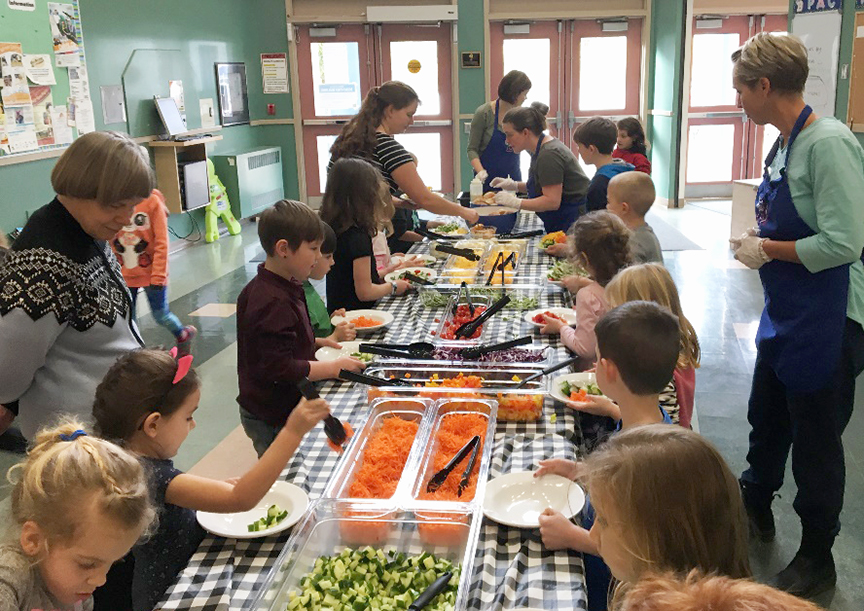(photo: Notice our youngest are using china dishes and washable forks!)
“Best thing the school has ever done” – Liam gr. 7
Brooklyn Elementary School, Comox, BC
2018-2019 (Grant Year 1)
It was a brand-new Kindergarten parent at Brooklyn Elementary who proposed and led the Salad Bar idea. Maurita Prato, who also works for LUSH Valley, a food sustainability action society, saw a great opportunity to make healthy local foods part of young children’s school experience.
Our PAC supported the idea in principle but was cautious, about volunteer pressure that could affect their operations, too. The school was also supportive of the idea but continued to struggle to find teacher leadership to provide that key food literacy learning piece we envisioned for our students. The Principal, Erica Black, and a small team of passionate parents proceeded despite the worries around them.
Brooklyn Elementary was the fourth school in our district (School District #71 – Comox Valley) @ComoxValleySD71, to receive a grant from Farm to Cafeteria Canada to support healthy foods and food literacy in our schools. Our community of schools: Ecole Robb Road Elementary, Lake Trail Middle School, Huband Park Elementary School and Mark R. Isfeld Secondary (the 5th school to receive a grant) banded with Brooklyn Elementary to share their craft knowledge on where to source local fresh produce and how to prepare the greens and vegetables so that they are desirable to our young students. They shared recipes for dressings, menus for salad bar themes that were as locally sourced as possible while also being exciting for children to experience.
Salad Bar was an instant “hit”! We began with an ambitious kick-off promotion where every child and staff member were invited to a complimentary salad bar visit. Our F2C grant application stated we would aim for 50 children maximum each time, and these launch days served up to 175 each day. A parent / local business owner donated an embroidered set of aprons to honour our volunteers and further the sense of pride our team had.
Because the kick off was so successful, we saw around 125 children pre-order salad bar each week. Our volunteers found the number to be manageable, so we stayed the course. Our groups were split (primary one week, intermediate the following week) to keep our numbers low, to keep our volunteers coming back and to keep our service sustainable.
We planned themes for the salad bars, many influenced by our community mentors: Southwestern, Mediterranean, Pasta, Wraps and our impromptu and most popular – Indigenous theme. We chose the Indigenous theme in honour of an Indigenous student who recently won a national contest and oozes pride for her heritage. To celebrate her we looked at adding items to our basic salad offerings (which included lettuce, cucumbers, peppers, carrots, sprouts, tomatoes, some sort of cheese) and chose seaweed, pine nuts, blueberries as well as bannock as a grain offering and smoked salmon as our first meat-based protein.
Indigenous themed salad bar with Miss Cheryl our Indigenous Support Assistant
Starting on January 8th, an average of 10 students per week were supported to receive salad bar through our schools Indigenous Support Worker- who funded the students through community links as an Indigenous healthy foods Initiative.
Next up is to continue the great work we started in our 6 short months of regular operation. We hope our volunteers will continue to help out – many are not our usual hot lunch volunteers, so it was exciting broadening our volunteer base. Some of them commented how Salad Bar volunteering feels better for them because of the healthy food offering. A couple proposed some super ways to keep children excited about new foods – a tasting station for less familiar fruit / veggies. This was a great way to promote conversation around the salad bar and while children were waiting in line, too. With great people come excellent ideas! Now we often hear our students saying in a hopeful tone ‘is it salad bar day?’





